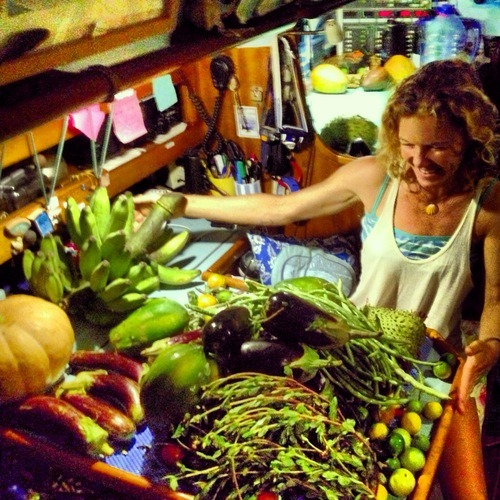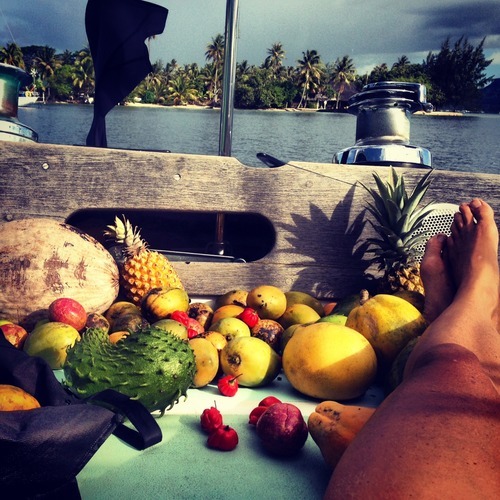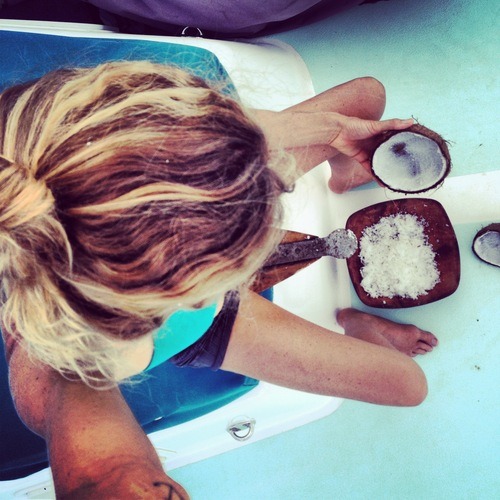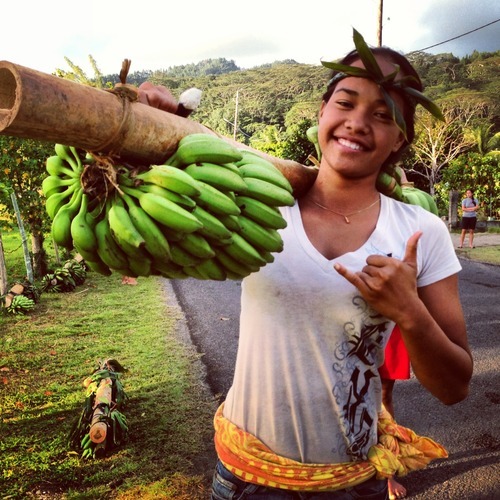This week for Tasty Tuesday, we invited Team B4BC surfer and environmentalist Liz Clark to give us the run-down on how she lives her life for Earth Day everyday. Check out her blog article below detailing a comprehensive guide to eating that will keep both you and the earth healthy, and her thoughts on eating meat, seafood, and GMO’s. Even if this is the only Earth Day article you read today, you can feel good about learning how to make a difference!
Mother Earth fills our bellies everyday, so in her honor I’ve decided to write about ‘food’ for Earth Day. We eat three times a day, everyday… so our food choices have a huge impact on our health and, simultaneously, the health of the planet. This topic is especially exciting for me, as I have tried eating ‘vegan’ for the last year and, after a bit of fine-tuning, I’ve never felt better! In addition to the physical ‘feel good’ benefits, I’ve realized that our daily food choices can be a powerful form of individual eco-activism, accumulating an enormous positive impact over time!
So here are a few Earth-friendly suggestions to consider—>
- Grow your own! Growing a veggie garden and planting edible plants in your yard is not only the best way to ensure that your food is chemical-free and charged with love, but you also reap the benefits of re-connecting with your food and gaining respect for the growing process. You automatically reduce your carbon footprint and might save yourself some cash, too! Veggie Garden Cheat Sheet, How to Build a Permaculture Vegetable Garden, Starting Your Permaculture Garden
- Support small-scale, organic farms and alternative methods to corporate agriculture! Gardening is not always an option, but buying food from local, organic farms generally is. Between consciously-sourced markets, farmer’s markets, community gardens, co-ops, and local growers that deliver a weekly box of fresh veggies, there are lots of ways to avoid buying from corporate farms. Large-scale agriculture is the least ecologically-sensitive way to grow food. Growing the same crop over large land areas does not take advantage of the naturally beneficial plant combinations that can eliminate the need for using pesticides and chemical fertilizers. Corporate farms do not consider the health of their workers, consumers, the ground water, the native plants and animals, and general public safety when they routinely spray highly toxic chemicals on our food and soil. UN: Eco Farming Feeds the World, Is Organic Farming the Key to Solving Hunger? And Climate Change?, Corporate Power in Agriculture
- Eat less or no meat! The large-scale factory farming of cattle, pigs, chickens and other livestock creates serious negative impacts on the environment. Greenhouses gas emissions, water pollution, deforestation, soil degradation, and habitat destruction are some of the grave consequences of mass meat production. Plus, calculations estimate that it takes anywhere from 2,500-12,000 gallons of water to produce 1 pound of beef, versus 60-200 gallons for 1 pound of potatoes, wheat, corn, or rice!? (Vegsource.com & David Pimentel Ecological Integrity: Integrating Environment, Conservation and Health Island Press, Washington DC, 2001). Health-wise, science has proven that people with diets high in animal protein are much more prone to heart disease and cancer. Heard of The China Study? The final straw for me to become vegan, was when I learned how horrifically animals are treated in these CAFOs (Concentrated Animal Feeding Operations). If you aren’t ready to give up meat, try to source it from wild or more humanely raised animals. Gary Yourofsky’s Best Speech You Will Ever Hear will educate you a lot on this issue!
- Eat less processed food! I like to think about trying to reduce the number of hands and machines and altering processes my food goes through before consuming it. During my outer island roaming and food-foraging, I decided that I liked eating whole foods because it made me feel closer to nature eating things that looked they came off a tree rather than out of a factory. Not only does eating whole food decrease the need for packaging, it ensures that you aren’t consuming artificial preservatives, flavorings, colors and any of the other thousands of often mysterious ingredients that are added to US foods. Various food dyes, Olestra brominated vegetable oil, potassium bromate, Azodicarbonamide, BHA, BHT, rBGH, rBST and arsenic are banned in other countries but still legal in US foods! There are certainly minimally processed options, but it’s worth having a closer look at food labels and reading between the lines as to what constitutes truly ‘natural’, healthy food. 9 Ways the Processed Foods Are Slowly Killing People, Dirty Secrets of the Food Processing Industry
- Boycott GMO-containing foods and companies!!! Despite that it is still unclear as to whether or not ‘genetically modified’ foods are safe for human consumption over time, Monsanto and the other ‘big 6’ biotech corporations—BASF, Bayer, Dow Chemicals, Dupont, and Syngenta—control nearly every aspect of our food system. They are responsible for creating most of today’s genetically modified foods along with producing the chemicals required to grow them. They’re also attempting to control and regulate the world’s seeds, so that farmers will be have to buy their patented GMO seeds. Not only is this threatening to destroy the critical biodiversity of seeds that humans have developed since the dawn of plant cultivation, it gives them a frightening amount of power! These billion dollar corporations are paying scientists to engineer ‘franken foods’ that are not always more ‘nutritious’. Monsanto’s “Roundup Ready” crops have been genetically engineered to allow direct application of the Monsanto herbicide ‘glyphosate’. This lets farmers drench both their crops and soil with this chemical to kill nearby weeds and pests without killing the plants, leaving the crops coated in this highly toxic chemical, the soil degraded, and the groundwater polluted. This is just a taste of these companies’ multitude of ecologically and socially irresponsible practices. Please educate yourself further on this issue! On March 26th of this year, The Monsanto Protection Act was signed into US law, essentially giving GMO companies immunity to the federal courts and states that even if future discoveries show that GMOs cause significant health problems. Total boycott of GMO-containing foods is a powerful way to show that we do NOT approve of all this! Documentary: ‘The World According to Monsanto’ , Surf Legend Kelly Slater Attacks GMOs and Biotech Giants, Surfing for Change’s Latest film: Pro Surfers vs GMOs by fellow Patagonia Ambassador Kyle Thiermann
- When/if eating seafood, please choose wisely… Through my years on the sea, I’ve watched and participated in fishing of many kinds. On voyages to more remote island groups, I’ve seen by comparison, how drastically reduced the fish stocks are in more populated, overfished places. These populations now look farther and more remotely to supply their seafood. Ultimately, this is not a sustainable solution. Most of our critical global fish stocks are in steep decline, and although I often enjoyed sustenance fishing, after seeing the results of overfishing first hand, I no longer feel comfortable consuming seafood. So I’ve decided to eat a plant-based diet where it’s an option. “A study of catch data published in 2006 in the journal Science grimly predicted that if fishing rates continue apace, all the world’s fisheries will have collapsed by the year 2048.” For those not ready to give up seafood entirely, there are certainly more sustainable choices. In general, eating lower on the ocean food chain, choosing wild versus farmed, and eating locally-caught options are more sustainable. There are even free apps for smartphones to help you decide quickly at a restaurant which might be the most sustainable seafood on the menu. Seafood Watch Iphone App, FAQs for Seafood Watch App, EDF Seafood Selector, Tackling Overfishing on Many Fronts, National Geographic: Overfishing
- When dining out, support restaurants that source their food from local, conscious suppliers! Try to keep up your conscious-eating standards when dining out. Asking nicely about food sourcing spreads awareness and promotes businesses to have healthier, Earth-friendly alternatives.
When I broke my neck in 2012, I spent a lot of time reading about healing through food. I wanted to be on my feet as soon as possible, so I studied up on which foods are conducive to healing and which hinder. I ate well, thought positively, and completely eliminated caffeine, refined sugar, meat, & alcohol. I healed incredibly quickly!!
Through that experience, I learned a lot about what I do and don’t want to eat. I’ve continued researching, experimenting, and using my intuition to understand what my body runs on best. It’s taken years to refine my eating habits to what they are now. I started by cutting out red meat and poultry…then reduced refined sugar and processed foods…then caffeine…then came dairy…and lastly fish. I’ve been amazed at the changes I’ve felt in my body in the past year of eating a very clean, plant-based diet. I feel strong, get sick less often, and have more energy than ever before! And all the nagging injuries I was suffering from have healed. I can’t be sure that this is all a result of my dietary changes, but I want to share that this adventure in food has been as awesome and profound as any of other.
Choosing to eat more consciously doesn’t mean you can’t make exceptions, or that dietary decisions are forever. I think we are all fabulously unique and this means no one type of diet suits everyone. If someone told me five years ago that I would stop eating cheese and not miss it, I would have laughed! This is a very personal process, and I’m not trying to tell people that eating this way is best. Rather, I’m encouraging everyone to go on their own dietary adventures and educate themselves to make more informed food choices. Doing so comes with the great benefits of better health for you and our dear Moma Earth!

It’s been so fun sourcing local organic growers in the South Pacific…It takes a little extra work, but it’s always a fun adventure and I generally come home to Swell overwhelmed with amazing food and new friends.

I even got to grow a few of my own this past year! Putting my hands in the dirt felt heavenly. Watching them grow and eating from the garden was a true blessing.

Grating coconut by hand…I use it to press for coconut milk, put in smoothies, curries, oatmeal, or just eat plain…SO tasty!!

Spread the word…partake in the radiance, positive impacts, and health of more plant-based nutrition for today and for the future generations who deserve to inherit a healthy Earth!! We can reduce and prevent diseases of all kinds, and reconnect with and heal our Great Mother. Here, the beautiful Hepua about to participate in a traditional Tahitian banana-carrying running race.








